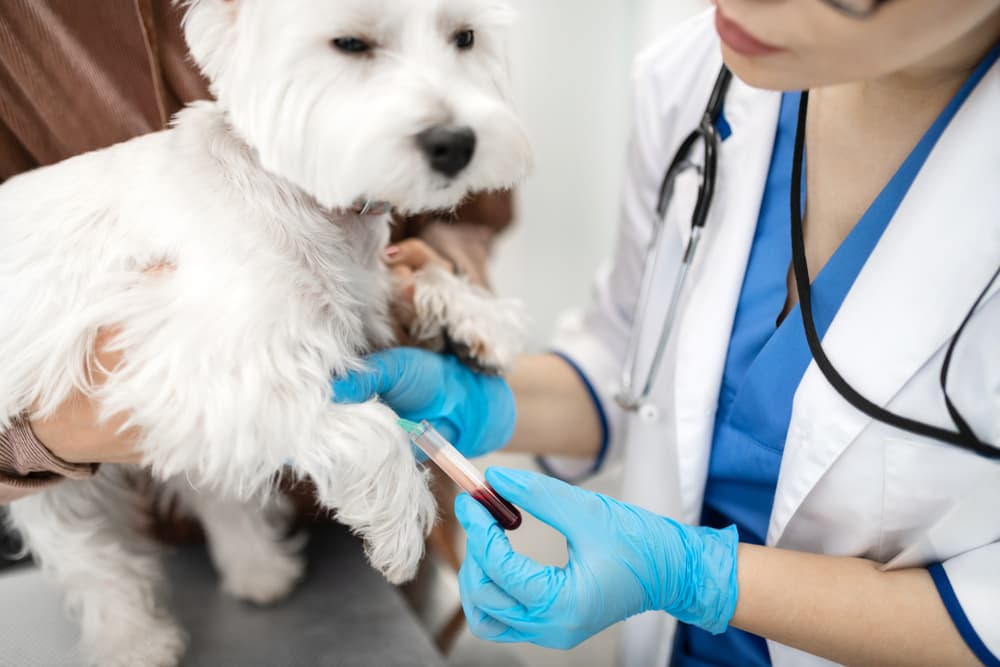Elevated Liver Enzymes in Dogs: Causes and What It Means

Your dog’s liver is an amazing organ with many important functions. The liver filters blood, removing toxins, and also has an important role in metabolism: producing bile that helps to digest fats in the small intestine and storing excess glucose (sugar) in the form of glycogen. The liver even has an essential role in blood clotting. Overall, it’s said to have over 500 vital functions!
With this organ being so important to your pet’s health, it can be very concerning to hear from the veterinarian that your dog has elevated liver enzymes. One of the challenges is determining if liver enzymes are elevated due to liver disease or a non-liver cause. Here, we’ll discuss what elevated liver enzymes mean, what may have caused this to happen, and next steps to take.
What Are Liver Enzymes in Dogs?
Liver enzymes are important proteins for specific chemical reactions within the body. Liver enzyme values are considered an important component of your dog’s routine health screening. When they’re elevated, it generally indicates inflammation or damage to the liver.
Common liver enzymes to note on your pet’s blood work include:
- ALT (alanine aminotransferase)
- AST (aspartate aminotransferase)
- ALP (alkaline phosphate)
- GGT (gamma-glutamyl transpeptidase).
We can divide these liver enzymes into two groups:
- Enzymes that indicate hepatocellular damage, which is damage to the actual liver cells (ALT and AST)
- Enzymes that indicate cholestasis, which is reduced or stopped bile flow (ALP and GGT)
Elevated Liver Enzymes in Dogs: What They Mean
Most routine blood work will include liver enzymes, allowing your veterinarian to screen for liver disease. Additionally, specific blood tests called liver panels, which also include liver enzymes, may be run in your dog if there is high concern for or history of liver disease. Elevated liver enzymes in dogs could indicate damage to the liver cells or issues with bile movement.
Whether or not your veterinarian is concerned by elevated liver enzymes depends on several factors, such as:
- Degree of elevation
- Symptoms your dog might be showing
- Whether the enzyme levels are static or increasing over time
- How many enzymes are elevated
- Other blood work and urinalysis findings
- Patient age
If any of these enzymes are decreased on the lab work, it’s not considered a significant finding.
Causes of Elevated Dog Liver Enzymes
Liver enzymes can be elevated for several reasons. We’ll break this broadly into three categories:
Damage to the liver or bile flow issues
- Toxins could include xylitol, blue-green algae, Amanita mushrooms, aflatoxins, sago palms, and heavy metals
- Infectious causes such as leptospirosis, infectious canine hepatitis, or histoplasmosis
- Tumors of the liver, gallbladder, or biliary tract
- Liver inflammation (hepatitis)
- Cirrhosis
- Gallbladder inflammation (cholecystitis)
- Gallbladder distended with mucoid content (gallbladder mucocele)
- Breed-related disorders, such as copper storage hepatopathy
Non-liver diseases
- Cushing’s disease
- Diabetes
- Hypothyroidism
- Pancreatitis
- Intestinal disease
- Congestive heart failure
- Seizures
- Sepsis
- Muscle injury
- Congenital portosystemic shunt (blood bypasses liver so it isn’t detoxified)
- Conditions affecting the bones, such as osteosarcoma, osteomyelitis, or multiple myeloma
- Specific medications, such as steroids, phenobarbital, some chemotherapies, or carprofen
Normal factors
- It is normal for puppies to have an elevated ALP because this enzyme is also produced from growing bones, not just the liver cells
- Nodular hyperplasia, which is very common in older dogs, can cause increased liver enzymes
Ultimately, there are many potential causes for elevated liver enzymes, some of which may not be included here. If your veterinarian plans to determine the underlying cause, additional testing will need to be performed.
Next Steps for Dogs with Elevated Liver Enzymes

Your veterinarian will look at the whole picture when determining your pet’s next steps. Routine blood work has other values that can suggest if the liver is functioning appropriately or is damaged, including blood urea nitrogen (BUN), albumin, cholesterol, glucose, and total bilirubin. Changes in these values may be helpful in determining if your pet has reduced liver function or obstructed bile flow.
If your veterinarian is not concerned about your pet’s elevated liver enzymes, they may recommend rerunning labs in 1-3 months. In some cases, they may start your pet on medications to protect the liver and then recheck after your pet completes the medications. Two additional laboratory tests – bile acids and blood ammonia – may also be recommended.
Bile acid testing can detect whether the liver is functioning appropriately. With this test, your pet’s blood is drawn after a 12-hour fasting period. Your pet is then fed, and blood is drawn again two hours later. Significantly elevated bile acids after eating could indicate liver dysfunction.
Ammonia levels can also be a good indicator of liver function. In normal pets, small protein molecules called amino acids are broken down into ammonia in the intestines. The ammonia is absorbed into the blood and converted into urea by the liver. Increased ammonia levels in the blood is indicative of liver dysfunction, meaning that the liver is struggling to convert the ammonia.
If your veterinarian is concerned about the liver enzyme elevation, they may recommend an abdominal ultrasound to visualize the liver. In some cases, liver biopsies may be recommended. While some veterinarians may feel comfortable collecting samples of the liver using a long needle and ultrasound machine, collecting liver biopsies is often a surgical procedure.
If your dog has symptoms of liver disease, such as poor appetite, vomiting, diarrhea, neurologic signs, fluid in the abdomen (ascites), or jaundice, your veterinarian will likely take a more aggressive approach to determine the cause of their symptoms. This could include imaging (abdominal ultrasound, CT scan), liver biopsies, and hospitalization while figuring out the cause of symptoms. Importantly, if your veterinarian suspects liver disease, they will likely want to test your pet’s ability to clot their blood prior to surgical intervention or liver biopsy.
How to Treat Elevated Liver Enzymes in Dogs
How to treat elevated liver enzymes in dogs depends on the underlying cause.
If your pet is not acting sick, your veterinarian may simply start your pet on a trial of antibiotics, antioxidants like Denamarin, and/or other prescription medications like Ursodiol and then recheck the liver enzymes after the medications.
Typically, Denamarin is recommended for concerns regarding hepatocellular damage, while Ursodiol may be more beneficial if there are gallbladder concerns. Your pet may be placed on both of these medications or other medications with similar active compounds, and they can typically receive them at home.
Treatment can be more complicated if other causes are suspected. For example, a liver tumor is often treated surgically. Leptospirosis typically requires hospitalization on intravenous fluids and treatment with an antibiotic called doxycycline. Chronic hepatitis may require immunosuppressive drugs, such as steroids. With signs of liver failure or severe illness, your pet will likely need to be hospitalized for several days.Keep in mind that your dog’s liver enzymes may be elevated due to other conditions, such as Cushing’s disease or pancreatitis. In those cases, treatment would focus on the underlying cause for the elevated liver enzymes rather than on the liver itself.









